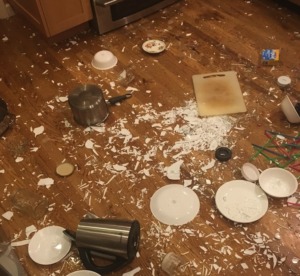The proposal for Enhanced Behavior Support Homes (EBSH) in Washington state is an attempt to provide appropriate housing options to meet the needs of DDA-eligible individuals with high-needs autism and / or IDD who experience significant challenging behaviors.
By significant challenging behaviors we are referring to those individuals who experience serious dysregulation resulting in:
· Self-injury: biting skin, pulling one’s own hair out, knocking into walls and furniture with no regard to personal safety, head-banging to the point of detaching one’s retina.
· Injury to others: bruising, biting, injury causing the caregiver to require medical attention, including concussion.
· Lack of awareness of personal safety: bolting in busy parking lots or into traffic, entering unfamiliar neighbor’s house, making their way towards water that poses a risk of drowning, grabbing sharp objects such as knives and scissors incorrectly, resulting in injury.
· Property damage: broken windows, holes in the walls, broken equipment such as iPads, TVs, and computers.
· Frequent police involvement (Parents will often call 911 with the hope of getting help but often the behavior is seen as criminal, not as a manifestation of their disability. Members of the community often see significant challenging behaviors as criminal, which is especially dangerous for our BIPOC community.)
· Frequent trips to the Emergency Department (ED): With limited care available for this population, they are often sent home unsafe, only for the cycle to repeat. Worst case scenario is that the individual is stuck in the ED, inpatient mental health unit, or a medical bed not designed for this population, nor staffed by those with professional experience to effectively manage their behavior. Instead, they are often overmedicated and / or restrained, which is traumatizing for the individual and the family.
Examples of significant challenging behaviors from parents and caregivers:
“She picks her skin and has open sores all over her body. She hits her head very hard on walls which has caused large bumps on her skull. She punches her closed fist into her face very hard.”
“My son has kicked out windows with his feet. He has kicked holes through doors and in the walls many times. He throws hard objects (iPad, books, chairs) at others. He tips tables over, breaks TV screens, throws lamps.”
“When my son is dysregulated, he runs towards a window at full speed and pushes the glass, which has resulted in injury when the glass breaks, requiring a trip to the ED for stitches.”
“He has grabbed my hair, dropped to the ground, bringing me down with him. I’ve had many bruises from being pinched on my arms. My nose was broken by a head butt. My husband had two ruptured/ herniated discs last year from trying to help my son keep his body safe.”
We understand these are powerful and hard-to-hear descriptions of challenging behaviors. They are painful for families to discuss. We as parents hold our loved-one’s privacy and dignity in high regard. We don’t like sharing the most difficult moments in their life, but we have realized remaining silent about the difficult and often graphic realities we live is not benefiting our children. The silence, and often the shame, have led to the lack of understanding of their needs and, as a result, the complete lack of crisis services they desperately need. Examples and stories reveal the realities, they raise awareness, and encourage vital funding to address the unique needs of our profoundly impacted IDD and/or autism community.


